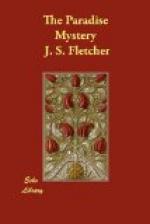Then he looked more clearly, seeing Bryce to be pale and excited. Bryce laid a hand on the lad’s arm.
“Look here!” he said. “There’s something wrong—again!—in here. Run down to the police-station—get hold of Mitchington—quietly, you understand!—bring him here at once. If he’s not there, bring somebody else—any of the police. But—say nothing to anybody but them.”
Dick gave him another swift look, turned, and ran. And Bryce went back to the dead man—and picked up the tin bottle, and making a cup of his left hand poured out a trickle of the contents. Cold tea!—and, as far as he could judge, nothing else. He put the tip of his little finger into the weak-looking stuff, and tasted—it tasted of nothing but a super-abundance of sugar.
He stood there, watching the dead man until the sound of footsteps behind him gave warning of the return of Dick Bewery, who, in another minute, hurried through the bushes, followed by Mitchington. The boy stared in silence at the still figure, but the inspector, after a hasty glance, turned a horrified face on Bryce.
“Good Lord!” he gasped. “It’s Collishaw!”
Bryce for the moment failed to comprehend this, and Mitchington shook his head.
“Collishaw!” he repeated. “Collishaw, you know! The man I told you about yesterday afternoon. The man that said—”
Mitchington suddenly checked himself, with a glance at Dick Bewery.
“I remember—now,” said Bryce. “The mason’s labourer! So —this is the man, eh? Well, Mitchington, he’s dead!—I found him dead, just now. I should say he’d been dead five to ten minutes—not more. You’d better get help—and I’d like another medical man to see him before he’s removed.”
Mitchington looked again at Dick.
“Perhaps you’d fetch Dr. Ransford, Mr—Richard?” he asked. “He’s nearest.”
“Dr. Ransford’s not at home,” said Dick. “He went to Highminster—some County Council business or other—at ten this morning, and he won’t be back until four—I happen to know that. Shall I run for Dr. Coates?”
“If you wouldn’t mind,” said Mitchington, “and as it’s close by, drop in at the station again and tell the sergeant to come here with a couple of men. I say!” he went on, when the boy had hurried off, “this is a queer business, Dr. Bryce! What do you think?”
“I think this,” answered Bryce. “That man!—look at him!—a strong, healthy-looking fellow, in the very prime of life—that man has met his death by foul means. You take particular care of those dinner things of his—the remains of his dinner, every scrap—and of that tin bottle. That, especially. Take all these things yourself, Mitchington, and lock them up —they’ll be wanted for examination.”
Mitchington glanced at the simple matters which Bryce indicated. And suddenly he turned a half-frightened glance on his companion.




